Morning,
We managed to configure also the hiera backend in order to have eyaml module active. It is related to the following past article http://log-it.tech/2017/05/29/install-eyaml-module-on-puppet-master/. So in the hiera.yaml you bassicaly need to add the following configuration before hierarchy:
:backends: - eyaml - yaml - puppetdb
and
:eyaml:
:datadir: /etc/puppetlabs/hieradata
:pkcs7_private_key: /etc/puppetlabs/puppet/eyaml/private_key.pkcs7.pem
:pkcs7_public_key: /etc/puppetlabs/puppet/eyaml/public_key.pkcs7.pem
:extension: 'yaml
at the botton. After this is done, the most essential part is that you created the required symlinks so that the backend is enabled.
This should be done easily with a bash script like:
#!/bin/bash
ln -s /opt/puppetlabs/puppet/lib/ruby/gems/2.1.0/gems/hiera-eyaml-2.1.0/lib/hiera/backend/eyaml /opt/puppetlabs/puppet/lib/ruby/vendor_ruby/hiera/backend/eyaml
ln -s /opt/puppetlabs/puppet/lib/ruby/gems/2.1.0/gems/hiera-eyaml-2.1.0/lib/hiera/backend/eyaml_backend.rb /opt/puppetlabs/puppet/lib/ruby/vendor_ruby/hiera/backend/eyaml_backend.rb
ln -s /opt/puppetlabs/puppet/lib/ruby/gems/2.1.0/gems/hiera-eyaml-2.1.0/lib/hiera/backend/eyaml.rb /opt/puppetlabs/puppet/lib/ruby/vendor_ruby/hiera/backend/eyaml.rb
ln -s /opt/puppetlabs/puppet/lib/ruby/gems/2.1.0/gems/highline-1.6.21/lib/highline /opt/puppetlabs/puppet/lib/ruby/vendor_ruby/highline/
ln -s /opt/puppetlabs/puppet/lib/ruby/gems/2.1.0/gems/highline-1.6.21/lib/highline.rb /opt/puppetlabs/puppet/lib/ruby/vendor_ruby/highline.rbAfter this is done, it is advised for a puppetdb and puppetserver restart, and you can try testing it by putting a string in hiera and see if a notice prints the required output. Something like
profiles::test::teststring: '[string generated with eyaml ecrypt -s 'test']'
and then creating a small class like :
class profiles::test{
$teststring = hiera('profiles::test::teststring')
notice {"${teststring}":}
}That should be most of you need in order to do this. Hope it works! 🙂
Cheers!
